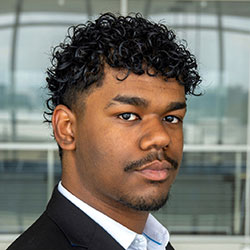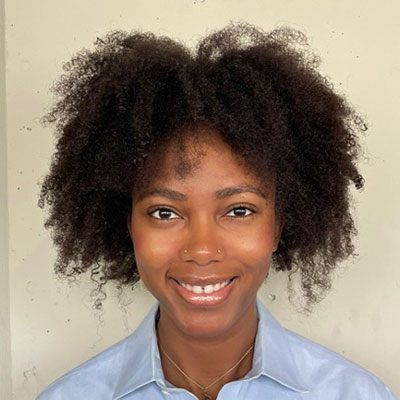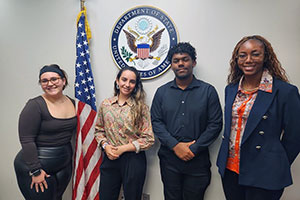Every year, the FIU Office of Global Learning Initiatives facilitates a Transformation Contest whereby students submit artistic or informational work representing a moment they felt transformed by an international or intercultural experience. A committee of experienced global learning faculty members, students, and alumni review the students’ applications and select the winners based on the creativity, originality, and compelling expressions of transformation of their work.
The winners of this year's contest went to Washington, D.C. to participate in a series of visits to federal agencies and nonprofits, which included the Peace Corps, U.S. Department of State, U.S. Agency for International Development (USAID), Global Ties, Partnerships for Public Service, and United Nations Foundation. The fly-in also incorporated making connections with ten FIU alumni that were based in D.C.
The goals of the fly-in are for the students to learn about the different career pathways that exist in government, to identify opportunities to engage in D.C., and to network with peers and potential colleagues.
Student Perspective Spotlight
We interviewed two students from this group, who were at different levels of their education, to shed light on their experiences.

Jesus Antonio Aracena
Jesus, a sophomore at FIU working on a Bachelor’s in Art, shares his insights.
Q. During your fly-in, you connected with a variety of FIU alumni. Could you provide some insight as to how you felt interacting with these alumni in D.C.?
A. Meeting with the various alumni fostered a sense of community in a completely unknown place for me. Being able to connect with Miami natives and their travel to D.C made me feel more comfortable about the idea of moving to a completely new place where I have no family.
Q. How will this fly-in inform your next steps in school or in the “real world?”
A. This fly-in affected how I will approach my future of where I will be living. I never once gave it thought that it could be possible to live somewhere beyond Miami until I traveled to D.C. I hope to be able to find internships relating to art in D.C. and be able to get my museum career started, step by step.
Q. Looking back from when you applied, were there any unexpected insights you developed that you did not anticipate beforehand?
A. In terms of insight, I was surprised to see how many different avenues there could be for artists working in higher government positions. I wasn’t sure that I could find many, but with the help of the fly-in, it was made possible.

Susan “Iyo” Aghedo
Iyo, who graduated from FIU in Spring 2024 with a Bachelor’s in Psychology, shares her insights.
Q. During your fly-in, you connected with a variety of FIU alumni. Could you provide some insight as to how you felt interacting with these alumni in D.C.?
A. As a recent graduate, entering the job market feels very scary and new. Meeting successful FIU alumni talking about their paths to their current positions helped quell my anxiety about this transitional period. It was easier for me to imagine myself, five years from now, in their shoes with a successful career after seeing them. Also, knowing I have a network of support and seeing how excited they were to connect with us and give us mentorship felt amazing.
Q. How will this fly-in inform your next steps in school or in the “real world?”
A. This fly-in opened my eyes to more resources than I thought I had. As a Psychology major with a global inclination, I learned ways that I can gain experience that will benefit my future career in a field that I previously thought did not relate to it. There are so many different government programs such as the Fulbright research award and Peace Corps that don’t require a complete career shift into the public sector, but would help me gain experience working with diverse populations in different countries.
Q. Looking back from when you applied, were there any unexpected insights you developed that you did not anticipate beforehand?
A. I didn’t expect there to be so many different types of positions available within the government. Going in, I had a pretty one-dimensional view of the types of people and majors that were qualified to do government work, but now I see that there are many different options, both short and long-term to work with the government.

